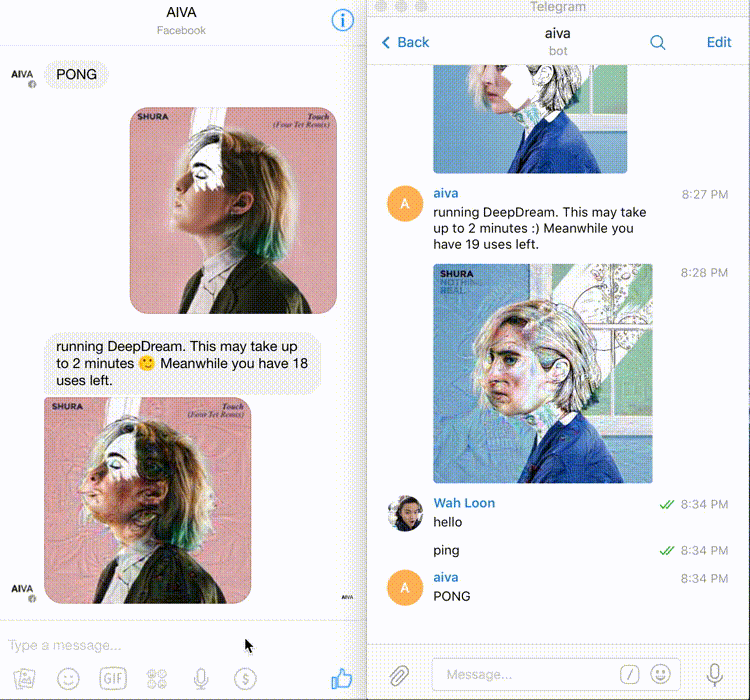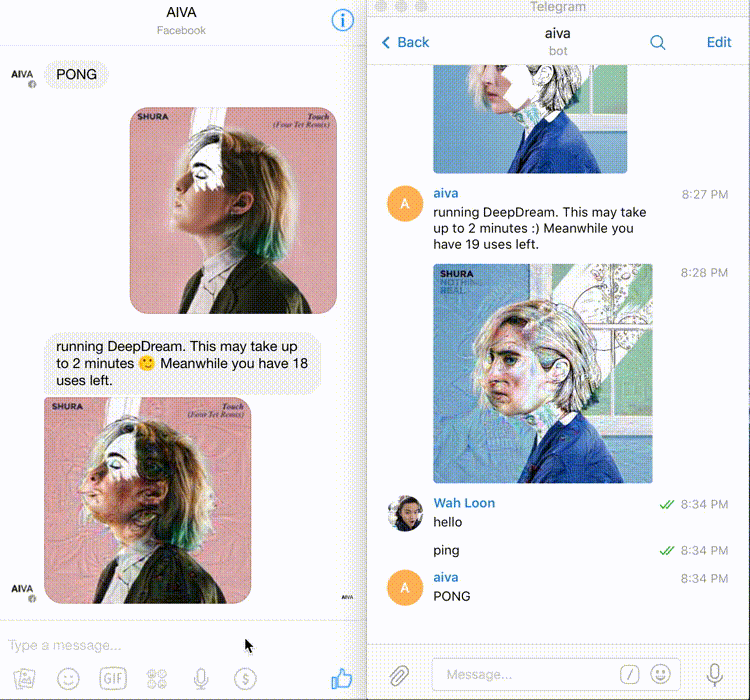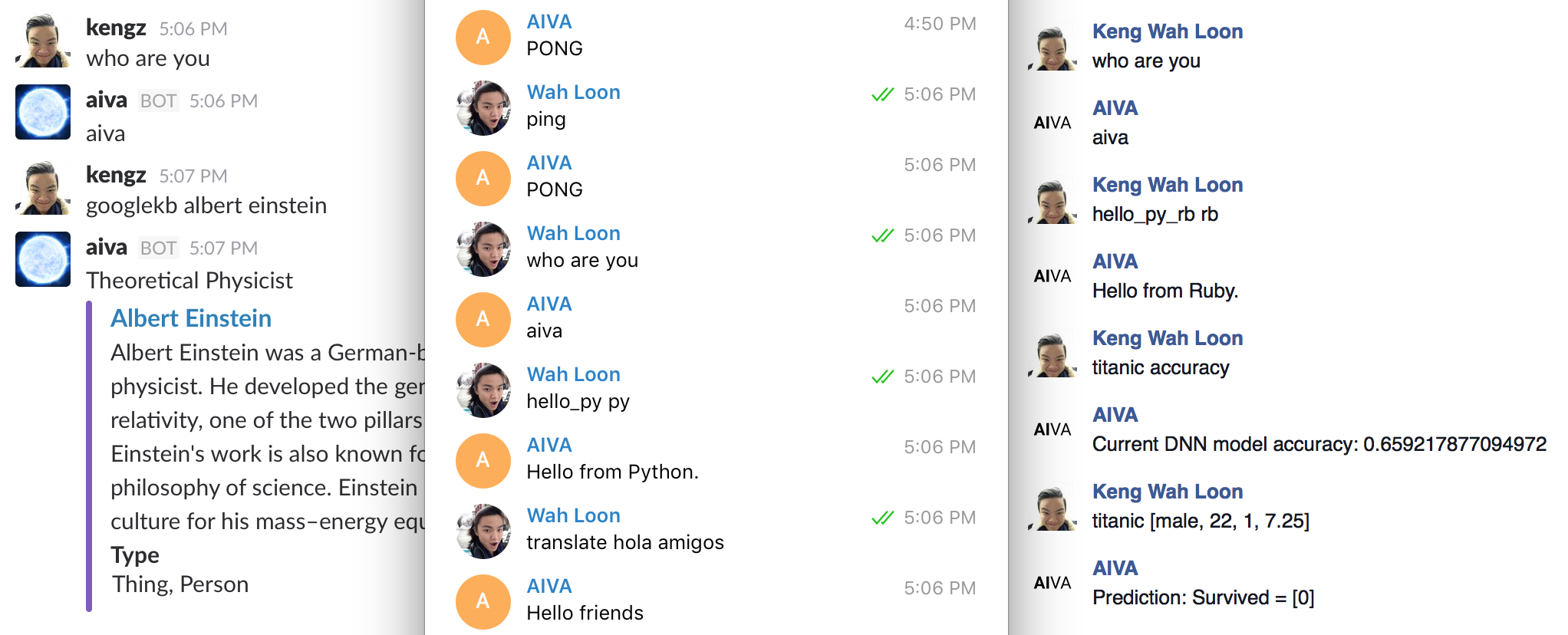AIVA (A.I. Virtual Assistant): General-purpose virtual assistant for developers. https://kengz.github.io/aiva-doc/
This project is under extension - to build a Contextual Graph Knowledge Base for knowledge encoding. Check Roadmap for more.
It is a bot-generalization: you can implement any features, use with major AI tools, deploy across platforms, and code in multiple languages.
| AIVA is | Details |
|---|---|
| general-purpose | An app interface, AI assistant, anything! |
| cross-platform | Deploy simultaneously on Slack, Telegram, Facebook, or any hubot adapters |
| multi-language | Cross-interaction among Node.js, Python, Ruby, etc. using SocketIO. |
| built-in with AI tools (not preinstalled since v4) | Tensorflow, SkFlow, Scikit, Pandas, Indico.ml, spaCy, Watson, Google APIs |
| hackable | It extends Hubot. Add your own modules! |
| powerful, easy to use | Check out setup and features |
To see what they mean, say you have a todo-list feature for AIVA, written in Node.js and leverages NLP and ML from Python. Set your todo list earlier from Slack on desktop? You can access it from Telegram or Facebook on mobile.
Deepdream in AIVA (checkout v3.2.1), only took a few hours on the Deepdream module, and deployed it in AIVA in just minutes. Runs on Fb and Telegram simulteneously:


We see people spending a lot of time building bots instead of focusing on what they want to do. It still requires much effort to just get a bot up and running. Moreover, the bot built is often confined to a single language, single platform, and without AI capabilities.
Why restrict when you can have all of it? Why build multiple bots when you can have one that plugs into all platforms and runs all languages?
AIVA exists to help with that - we do the heavy-lifting and build a ready-to-use bot; it is general purpose, multi-language, cross-platform, with robust design and tests, to suite your needs.
AIVA gives you powerful bot tools, saves you the time to build from scratch, and allows you to focus on what you want to do. Morever, you can build once, run everywhere with AIVA's multi-adapter (Slack, Telegram, Fb).
1. Fork this repo so you can pull the new releases later:
2. Clone your forked repository:
git clone https://github.com/YOURUSERNAME/aiva.git
To sync the latest release of AIVA to your fork:
git remote add upstream https://github.com/kengz/aiva.git
git fetch upstream
git merge upstream/master
The line below runs bin/setup && bin/copy-config && npm install:
npm run setup
Then edit config/ files: default.json(development), production.json(production, optional), db.json(mysql)
The command installs the dependencies via bin/install && npm install, and prepare the database for aiva to run on. The dependencies are minimal: nodejs>=6, python3, and mysql.
See bin/install for the full list, and customize your own. This also runs the same sequence as the CircleCI build in circle.yml.
Docker. We also offer a Docker image kengz/aiva. It runs the same except with an extra layer of Docker. See Docker installation for more.
npm start # runs 'aivadev' in development mode
# Add flags for more modes
npm start --debug # activate debug logger
npm start production # runs 'aiva' in production mode
See Commands for more. This will start AIVA with the default hubot adapters: Slack, Telegram, Facebook (only if activated). See Adapters for connecting to different chat platforms.
AIVA saying hi, translating, running deep neural net; on Slack, Telegram, Facebook:
Check Setup tips for help.
AIVA was known as Jarvis in version 2. It is now deprecated, but if you need to reference stuff from Jarvis, do git checkout tags/v2.0 or checkout the releases.
AIVA v3 was last released at v3.2.1, which was full featured, but quite heavy. We retire it in favor of a lighter, more developer-friendly and extendible version.
- a built in graph brain for ad-hoc knowledge encoding, using CGKB and HTMI
- a built in NLP intent-parsing engine
We'd love for you to contribute and make AIVA even better for all developers. We're mainly interested in something generic and foundational, e.g. adding client for a new language, improving the NLP, adding a useful generic module, adding more adapters like Skype or Twilio.




